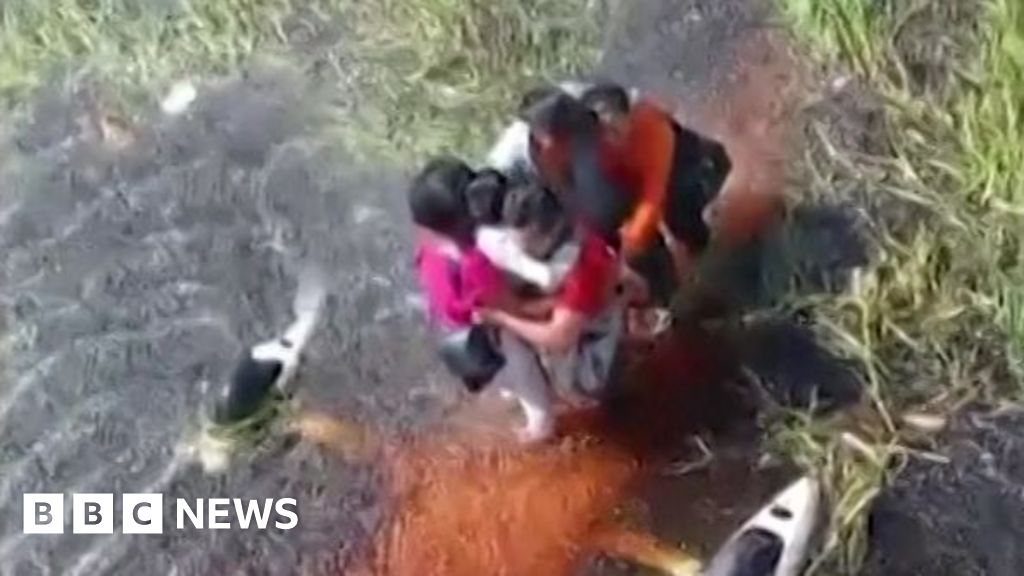Political deadlock frustrates Bougainville’s aspirations of independence | Politics News
Nearly five years after the islanders of remote Bougainville voted decisively in a referendum for independence from Papua New Guinea (PNG), local frustrations are rising as the political process falters.
More than 97 percent of voters in the autonomous island region of about 300,000 people, in eastern PNG, chose independence over greater autonomy in a 2019 referendum. But there cannot be a change in its political status until the result has been ratified by PNG’s parliament.
After high-level talks stalled, parliamentary ratification, which was supposed to take place last year, failed to happen. Achieving it this year is “a possibility, but not yet a likelihood”, Professor Anthony Regan of the Department of Pacific Affairs at the Australian National University (ANU) told Al Jazeera.
Last year, major disagreements about how the ratification process should work led to a breakdown in talks between the national and Bougainville governments. A major bone of contention is that Bougainville wants the parliamentary vote to be a simple majority, while PNG says it should be a two-thirds majority.
Both parties have agreed an international moderator is needed to break the deadlock, but any appointment is likely to take time.
“I am not too satisfied with the current progress [of Bougainville’s Independence]. It’s almost five years since the referendum, and there is still no positive response from the PNG government,” Barbara Tanne, president of the Bougainville Women’s Federation, told Al Jazeera.
It is deeply “frustrating”, Theresa Jaintong, a local government member in Arawa, Central Bougainville, added. “After joint government meetings, the resolutions passed are not honoured … The PNG government must come out clear as we people of Bougainville must know.”
For 56-year-old Ishmael Toroama, the former rebel fighter who was elected Bougainville’s president in 2020 with a mandate to achieve statehood, the pressure is intensifying.
Last month, he called on PNG’s parliament to make good on their promises.
“I am committed to the independence of Bougainville,” he said in a statement.
Bougainville, reluctantly incorporated into the new nation of PNG in 1975, has long wanted to manage its own affairs. Demands for secession rose in the following decade amid anger about the severe environmental and social impacts of the Panguna copper mine in central Bougainville, then majority-owned by British-Australian mining giant Rio Tinto and the PNG government.
In 1989, an armed landowner uprising shut down the mine, and Bougainville and PNG became embroiled in civil war until 1998. A peace agreement in 2001 paved the way for autonomous government in 2005 and then the referendum.
But since the people of Bougainville voted emphatically for independence, PNG’s leaders have given the impression that they do not favour the region breaking away.
Last month, PNG Prime Minister James Marape stressed the need for the PNG parliament’s approval and acknowledged Bougainville’s request for an independent moderator in the discussions.
“While I personally sympathise with the desires of Bougainville, as prime minister, I must uphold our sovereignty and the rule of law,” Marape said in a public statement on May 9.
That could create trouble. “If the national government says no and does not want to ratify the referendum result, then there are options that Bougainville will take that could be harsh and heavy,” Peter Arwin, a landowner in Panguna, Central Bougainville, told Al Jazeera in an interview.
ANU’s Regan said that a ‘no’ vote by PNG would “be intended to make it clear that talk about the possibility of independence is over”. He said discussions might explore other options which fall short of independence, such as greater autonomy – although Bougainville’s Attorney General and Minister for Independence Ezekiel Masatt has dismissed the idea.
“There is open talk in Bougainville of the likely risks of leaders losing their lives were they to compromise … That possible threat indicates how little room there is to manoeuvre for the Bougainville government,” Regan said.
Mine controversy
Meanwhile, the Panguna mine, previously at the centre of the civil war, is now party to two competing legal challenges.
In May, a class action suit against Rio Tinto by nearly 4,000 local landowners and residents affected by the mine’s former operations was announced. The case, funded by unnamed foreign investors, is seeking billions of dollars in compensation for the mine’s social and environmental impact, which includes contamination of agricultural land and waterways.
“Rio Tinto have had more than 50 years to do right by the people of Bougainville, more than 25 years since the end of the civil war, and they have not done so. We are tired of waiting for justice and tired of Rio Tinto alone deciding what is best for Bougainville through their legacy impact assessment,” the lead claimant, Martin Miriori, told Al Jazeera.
A Rio Tinto spokesperson told the media the company was reviewing the details of the claim.

But Bougainville’s Toroama has denounced the suit. “I strongly condemn this court proceeding and view it as targeted towards hindering Bougainville’s economic independence agenda … those Bougainvilleans involved in pushing this class action have committed treason in the highest form,” Toroama said on May 24.
The lawsuit could interfere with a government-backed mediation process already under way between Rio Tinto and PNG and Bougainville stakeholders aided by the Australia-based Human Rights Law Centre. Through this initiative, Rio Tinto agreed to fund a Panguna mine impact assessment, which is due to make its first report in September.
Rio Tinto “will consider its position once it has seen the results … [But] there is a strong expectation from community and government stakeholders alike in Bougainville that following the release of the Phase 1 impact assessment report, Rio Tinto will commit to funding remediation of the huge problems left by the mine,” Keren Adams, legal director of the Human Rights Law Centre in Melbourne told Al Jazeera.
Communities living around the mine have suffered copper contamination of rivers and waterways, agricultural land rendered unusable by the dumping of mine waste and related health issues, such as respiratory illnesses and skin diseases.
Some residents in the Panguna area are wary of the lawsuit. “I do not support Panguna Mine Action because it’s a process that the majority of us are not aware of, as opposed to the legacy impact assessment, which is supported by the Bougainville and national governments. And we don’t know who the financial guarantor is … The implications of this are huge and risky,” Arwin said.
The Panguna mine, which the Bougainville government hopes to reopen, is seen as the only major source of revenue that could create economic self-sufficiency in the underdeveloped region, although it could take a decade and billions of dollars to rebuild.
Only about 10 percent of Bougainville residents have access to electricity, while just 16 percent of households have proper sanitation. Its large youth population – an estimated 40 percent of people are aged under 15 years – face high unemployment. Less than 20 percent of the government’s budget this year came from internal sources, making the island financially reliant on the national government and international donors.
Some experts believe that if PNG does not grant independence, Bougainville might consider a unilateral declaration. Such a move would make international support – from donors and governments – even more important.
In November last year, Toroama visited Washington, DC, to seek support from United States President Joe Biden’s administration for the region’s political aspirations, and he has also publicly called for backing from Australia.
Check out our Latest News and Follow us at Facebook
Original Source







